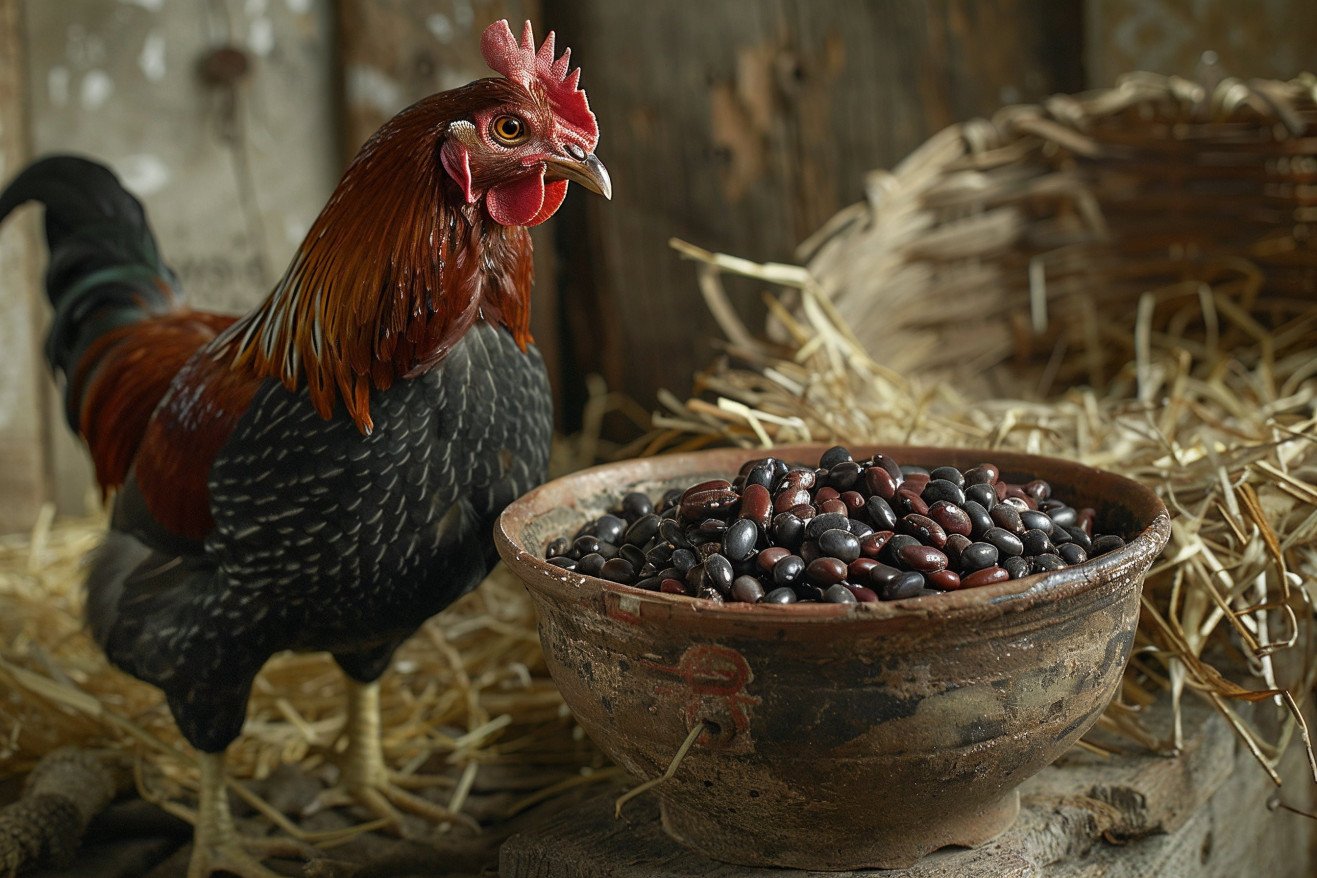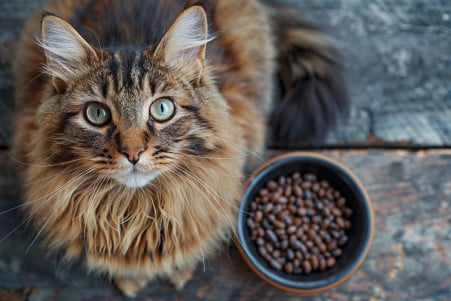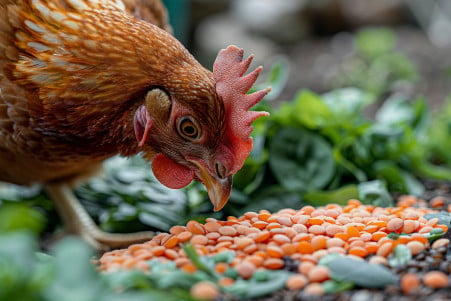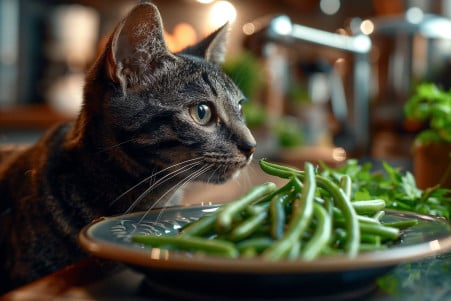Can Chickens Eat Black Beans? A Nutritional Analysis
29 May 2024 • Updated 29 May 2024

If you're thinking about adding black beans to your chickens' diet, you may be wondering whether or not this food is a good choice for your flock. Chickens can eat black beans as part of a well-rounded diet, but only in moderation. Black beans are high in protein, fiber, and minerals like iron, which can be good for chickens. However, they need to be cooked and should be given in small amounts because their high fiber content can lead to digestive problems if they're consumed in excess.
To help you figure out whether or not you should feed your chickens black beans, this article will take a look at the findings of agricultural and veterinary studies that have assessed the nutrient content of black beans and their potential as a supplemental food for chickens. As a result, you'll learn how much you can feed your chickens, as well as the advantages and disadvantages of feeding them black beans.
Can chickens eat black beans?
How to Prepare Black Beans for Chickens
Raw or undercooked black beans are not safe for chickens to eat because they contain antinutrients such as lectins and phytic acid that can block nutrient absorption. To make sure that your chickens can digest black beans properly, you need to cook, mash, or chop them into smaller pieces before you give them to your chickens.
The best ways to cook black beans for chickens are to boil, bake, or pressure cook them for at least 10-15 minutes to remove any potential toxins like phytohaemagglutinin, a substance that is found in raw beans and can be toxic to chickens. Canned black beans may not be fully cooked, so it’s best to heat them up before you give them to your chickens.
When you first start feeding your chickens cooked black beans, make sure to introduce them slowly and in small amounts, and watch your chickens closely for any signs of a bad reaction, such as digestive issues or a lack of interest in eating. In addition, ChickensDiet.com recommends washing the beans and mashing or chopping them into smaller pieces that are safe for chickens to eat so that your chickens can get used to eating them. This will help your chickens get used to eating them. If you prepare and serve them carefully, you can add black beans to your chickens’ diet in a healthy way.
Nutritional Benefits of Black Beans for Chickens
Black beans are a great source of plant-based protein, which is important for feather growth and egg laying in chickens. According to the Chicken Black Bean Nutrition Facts from Eat This Much, a serving of chicken and black beans has 41g of protein. This high protein content can be helpful for chickens to maintain their health and productivity.
In addition to protein, black beans are a source of dietary fiber, which can help with chickens' digestion and gut health. As mentioned on the BackYard Chickens forum, cooked black beans are safe for chickens to eat, and they can help with their digestive health.
Black beans are also a source of iron, which is important for chickens to maintain healthy blood. This makes black beans a great supplemental food that can be part of a healthy and balanced diet for chickens in moderation.
Risks and Side Effects of Overfeeding Black Beans
While black beans have a number of health benefits, feeding them in excess can lead to digestive problems in chickens, especially because of their high fiber content. The Organic Goat Lady explains that overconsumption of black beans can lead to diarrhea, bloating, and other digestive issues in chickens.
Black beans are toxic when raw or undercooked because they contain phytohemagglutinin, which can lead to poisoning if consumed in large amounts, according to The Open Sanctuary Project. Fresh Eggs Daily also notes that symptoms of toxicity from black beans can include everything from hemorrhaging to kidney failure.
It’s also possible that chickens can have an allergic reaction or sensitivity to black beans, especially if they’re being introduced to the food for the first time. That said, it’s important to feed chickens black beans in moderation, and they should not make up a large part of their diet.
Serving Sizes and How Often to Feed
According to What Not to Feed Chickens: 45+ Foods To Avoid At All Costs, raw beans, and especially red kidney beans, have lectins that are toxic to chickens and can cause a range of health problems, including diarrhea, vomiting, and a weakened immune system. To avoid these issues, black beans should be given to chickens only after they have been cooked by boiling for at least 10-15 minutes to remove any toxins.
As noted by So, Can Chickens Eat Beans? • New Life On A Homestead, black beans should make up no more than 5-10% of a chicken's diet to avoid digestive upset. It's best to give cooked black beans to chickens no more than twice a week as a supplement or protein source. For adult chickens, a portion of 1-2 tablespoons of cooked black beans per chicken is a good amount. For chicks between 8-12 weeks old, small amounts of cooked black beans can be introduced, starting with a few pieces.
It's important to monitor the chickens' consumption of black beans and adjust the portion sizes as needed, as pointed out by New Life On A Homestead. This gradual approach will help ensure that the flock can get used to the new food without any negative side effects.
How to Add Black Beans to a Chicken's Diet
Black beans should be used as a supplement to a chicken's diet, not as a main source of food. As mentioned on the BackYard Chickens forum, canned black beans are only partially cooked, so they should not be used as a staple in a chicken's diet. Instead, a balanced chicken diet should include a mix of grains, vegetables, fruits, and protein sources like bugs or seeds.
When feeding black beans to your chickens, you should introduce them in small amounts and then increase the amount as the chickens become more accustomed to them. You should also watch their reaction to the beans and adjust the amount or stop feeding them to the chickens if they experience any negative side effects, including digestive problems or allergies. As noted by New Life On A Homestead, it's important to use black beans in moderation when feeding them to chickens.
If you want to make sure that you're adding black beans to your chickens' diet in a way that's safe and healthy, you should talk to a vet or another chicken expert. They can help you come up with a plan that's tailored to your chickens' specific needs and health concerns.
Conclusion: Moderation and Monitoring for Safe Black Bean Feeding
When prepared and fed properly, chickens can eat black beans as part of a well-rounded diet. However, it's important to make sure that the beans are cooked thoroughly to remove any toxins and make them easier for the chickens to digest. Chickens should also be fed black beans in moderation and introduced to them slowly to prevent digestive problems and allergic reactions.
It's also important to monitor the chickens' intake and adjust the amount of black beans they're eating as needed to ensure that they stay healthy. Finally, if you're unsure about how to feed your chickens black beans, a veterinarian or poultry expert can help you come up with a plan that's tailored to your chickens' needs.


